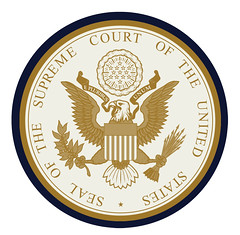 |
| Supreme Court of the United States Seal (Photo credit: DonkeyHotey) |
A. Neil CLARK, Field Office Director, Seattle, Washington, Immigration and Customs Enforcement, et al., Petitioners,
v.
Sergio Suarez MARTINEZ.
Daniel Benitez, Petitioner,
v.
Michael Rozos, Field Office Director, Miami, Florida, Immigration and Customs Enforcement.
543 U.S. 371
(2005)
v.
Sergio Suarez MARTINEZ.
Daniel Benitez, Petitioner,
v.
Michael Rozos, Field Office Director, Miami, Florida, Immigration and Customs Enforcement.
Syllabus
The syllabus constitutes no part of the opinion of the Court but has been prepared by the Reporter of Decisions for the convenience of the reader. See United States v. Detroit Timber & Lumber Co., 200 U.S. 321, 337, 26 S.Ct. 282, 50 L.Ed. 499.
If
an alien is found inadmissible and ordered removed, the Secretary of
Homeland Security (Secretary) ordinarily must remove the alien from the
country within 90 days. 8 U.S.C. § 1231(a)(1)(A).
Here, Martinez, respondent in No. 03–878, and Benitez, petitioner in
No. 03–7434, Cuban nationals who are both inadmissible under § 1182,
were ordered removed, but were detained beyond the 90–day removal
period. Each filed a habeas corpus petition challenging his continued
detention. In Martinez's case, the District Court found that removal
was not reasonably foreseeable and ordered that Martinez be released
under appropriate conditions. The Ninth Circuit affirmed. In
Benitez's case, the District Court also accepted that removal would not
occur in the foreseeable future, but nonetheless denied the petition.
The Eleventh Circuit affirmed.
1. Under § 1231(a)(6),
the Secretary may detain inadmissible aliens beyond the 90–day removal
period, but only for so long as is reasonably necessary to achieve
removal. Section 1231(a)(6)'s
operative language, “may be detained beyond the removal period,”
applies equally to all aliens that are its subject, whether or not those
aliens have been admitted to the country. In
Zadvydas v. Davis, 533 U.S. 678, 121 S.Ct. 2491, 150 L.Ed.2d 653, this Court interpreted § 1231(a)(6)
to authorize the detention of aliens who have been admitted to the
country only as long as “reasonably necessary” to effectuate their
removal.
Id., at 689, 699, 121 S.Ct. 2491. This interpretation must apply to inadmissible**719
aliens as well. Even if the statutory purpose and constitutional concerns influencing the
Zadvydas construction are not present for inadmissible aliens, that cannot justify giving the
same statutory text a different meaning depending on the characteristics of the aliens involved.
Crowell v. Benson, 285 U.S. 22, 52 S.Ct. 285, 76 L.Ed. 598,
Raygor v. Regents of Univ. of Minn., 534 U.S. 533, 122 S.Ct. 999, 152 L.Ed.2d 27, and *372
Jinks v. Richland County, 538 U.S. 456, 123 S.Ct. 1667, 155 L.Ed.2d 631, distinguished. Moreover, contrary to the Government's argument, nothing in
Zadvydas indicates that § 1231(a)(6) authorizes detention until it approaches constitutional limits. Nor does § 1182(d)(5) independently authorize continued detention of these aliens. Pp. 722–727.
2. In
Zadvydas, the Court further held that the presumptive period
during which an alien's detention is reasonably necessary to effectuate
removal is six months, and that he must be conditionally released after
that time if he can demonstrate that there is “no significant likelihood
of removal in the reasonably foreseeable future.” 533 U.S., at 701, 121 S.Ct. 2491.
The Government having suggested no reason that the time reasonably
necessary for removal is longer for an inadmissible alien, this same
6–month presumptive detention period applies in these cases. Because
both Martinez and Benitez were detained well beyond six months after
their removal orders became final, the Government has brought forward
nothing to indicate that a substantial likelihood of removal subsists,
and the District Court in each case has determined that removal to Cuba
is not reasonably foreseeable, the habeas petitions should have been
granted. P. 727.



No comments:
Post a Comment